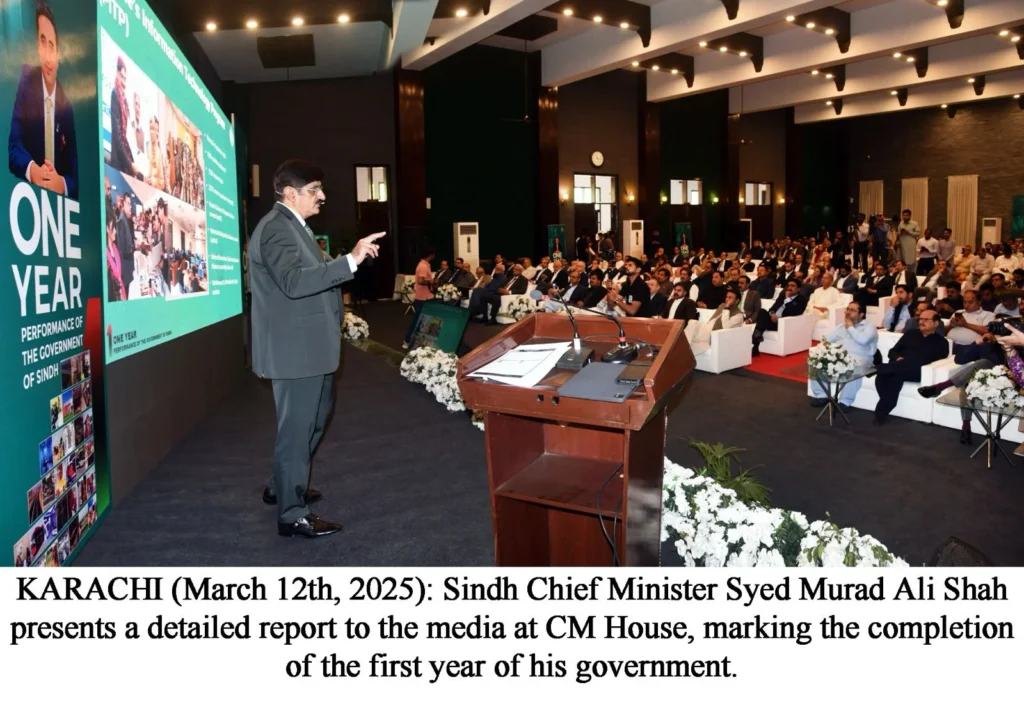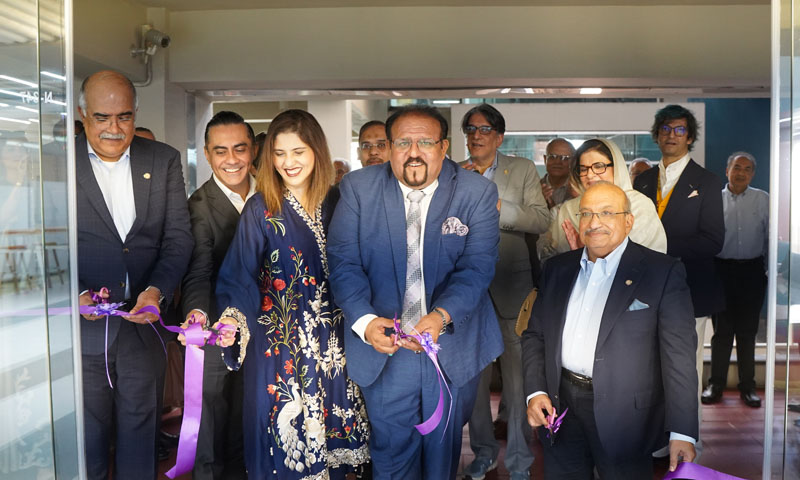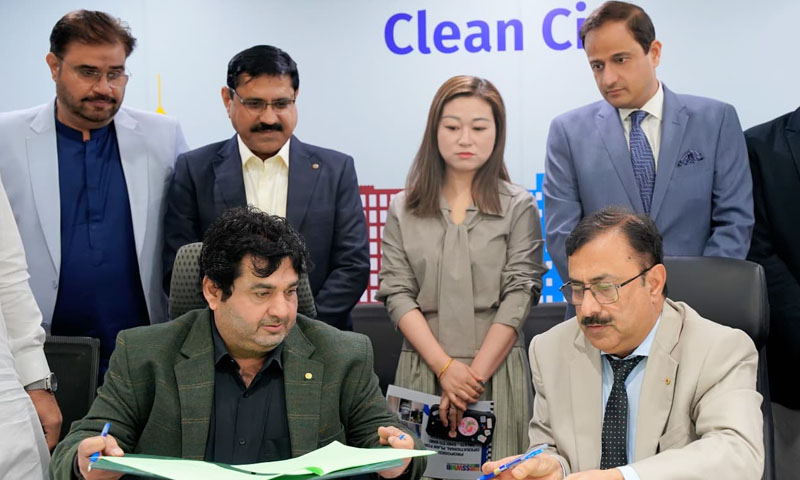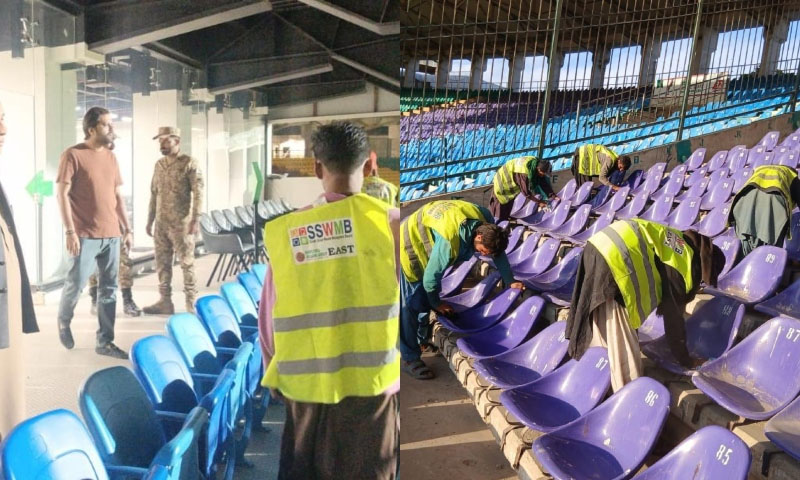- Web Desk
- Jan 12, 2026
Sindh government achieves notable progress in health, education, agriculture, and digital transformation
-

- Web Desk Karachi
- Mar 14, 2025

KARACHI (March 12, 2025): In a comprehensive 171-page report, Sindh Chief Minister Syed Murad Ali Shah announced significant achievements in various sectors, highlighting advancements in digital transformation, healthcare, education, water management, and infrastructure from March 2024 to March 2025. He outlined the government’s commitment to enhancing public services and socio-economic growth in the province.
Healthcare Advancements
Sindh’s healthcare sector has experienced substantial improvements, marked by ground-breaking initiatives and healthcare access expansion. The National Institute of Cardiovascular Diseases (NICVD) treated 1.4 million patients, performing over 5,000 cardiac surgeries and interventions. Notable advancements include the NICVD’s extension of paediatric cardiac services to Quetta, reaching underserved communities.
Other significant accomplishments include:
The Sindh Institute of Cardiovascular Diseases (SICVD) established a cardiac emergency centre in Baldia Town and launched a stroke program in Sukkur, treating over 119,000 patients.
The Institute of Medical Science in Gambat completed over 300 organ transplants, adopting advanced technology for robotic surgeries.
The Indus Hospital in Karachi expanded its capacity with a Rs5 billion grant, while Dow University introduced a linear accelerator for cancer treatment.
Furthermore, the Sindh Integrated Emergency Health Services expanded its ambulance services and launched a hypertension project. The ChildLife Foundation significantly transformed paediatric emergency care, establishing centres to reduce the infant mortality rate in Sindh to 2.9 percent, considerably lower than the national average of 5.4 percent.
Education & IT Development
To promote digital literacy, the People’s Information Technology Program awarded scholarships to 13,428 students, with 1,171 students completing their education and 2,528 securing jobs. An IT boot camp trained 1,500 graduates, facilitating self-employment for 870. Major initiatives included IT training for 3,000 university students and 200 teachers across several cities.
Water Management and Agriculture
The Sindh Irrigation Department established a Hydroinformatics Centre, aiding data-driven decision-making to improve water management. Additionally, 251 kilometers of watercourses were lined to prevent wastage, enhancing agricultural irrigation.
The government made strides in agriculture by distributing 219 tube wells, 434 agricultural tools, and 100 solar-powered tube wells. The Mamta Program disbursed Rs2.6 billion through its Conditional Cash Transfer model, benefiting pregnant and lactating women.
In support of rural women’s empowerment, 900 women received kitchen gardening kits, promoting self-sufficiency in food production. The government also introduced 13 new crop varieties for commercial cultivation, including cotton and wheat.
Infrastructure Development
Infrastructure development remained a focus, with the government completing 196 new roads and repairing 120 flood-damaged ones, covering a total of 2,500 kilometres at Rs53.5 billion. Key projects included the Hyderabad-Mirpurkhas Road and Tharparkar-Alibandar Road.
A noteworthy initiative involves the Sindh People’s Housing for Flood Affectees (SPHF), offering a beneficiary portal for checking housing statuses. The government launched a drone-based rural infrastructure mapping project to identify underdeveloped areas for future planning.
Law Enforcement and Governance Reforms
The Sindh Police modernized law enforcement by introducing the Smart Surveillance System (S4), featuring facial recognition cameras at 42 toll plazas, significantly enhancing public safety. Police records were fully digitized, improving operational efficiency in issuing licenses and managing criminal databases. Over 100,000 licenses were issued online in three months, marking Pakistan’s first separate budget allocation for Station House Officers.
Digital Governance Initiatives
The Excise & Taxation Department launched an online vehicle tax system, streamlining motor vehicle tax payments and digital vehicle registrations. The CLICK Karobar App was introduced to guide business registrations for 130 licenses and permits across various departments, enhancing ease of doing business.
Renewable Energy and Sustainability Efforts
Focusing on renewable energy, the Sindh government initiated solarization projects for schools, hospitals, and public buildings. A total of 200,000 solar home systems are being distributed, with plans for an additional 300,000.
The government has also invested in providing solar-powered tube wells and systems in the Thar Desert to benefit 200,000 residents. Moreover, 21,600 kilograms of farm-raised shrimp are being exported to Vietnam, marking a significant milestone in the country’s aquaculture industry.
Challenges and Future Plans
Reflecting on challenges, CM Murad Ali Shah warned of a potential wheat shortage due to lower-than-expected production but assured that 1.3 million tons of wheat are currently in reserve. The government will continue expanding digital services and improve business regulations to attract investment and enhance economic growth.
The Sindh government’s comprehensive report underscores a strong commitment to technological innovation, infrastructure development, and socio-economic growth. With a focus on improving healthcare access, educational advancement, and modernizing agriculture, the government aims to build a sustainable and prosperous future, enhancing the quality of life for residents across the province. The initiatives undertaken reflect the principles of the party’s founders — Shaheed Zulfikar Ali Bhutto, Begum Nusrat Bhutto, and Shaheed Mohtarma Benazir Bhutto — and are aimed at inclusive growth, ensuring that all segments of society benefit from the government’s efforts.




